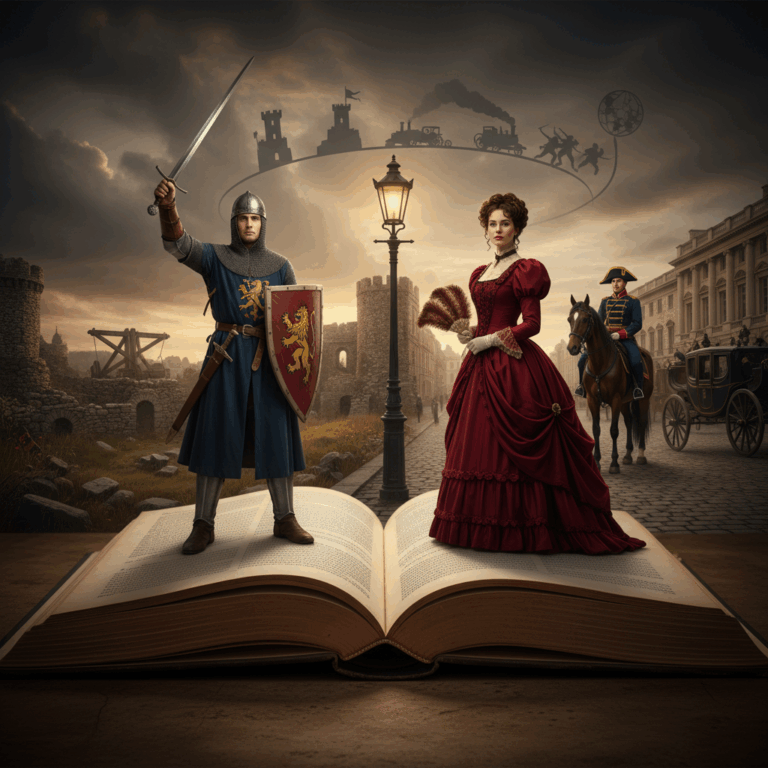Characteristics of historical fiction series
Historical fiction series are based on real events, offering a visual and narrative approach to transcendental times and events. Its success lies in combining information with entertainment.
These productions allow us to explore specific contexts, presenting historical characters and events from the creative perspective of scriptwriters. Thus, the viewer enjoys both learning and drama.
Contextualization in real events and times
The series recreate historical periods in detail, visually setting the periods to immerse the viewer in the context. This makes it easier to understand social, political and cultural factors.
Real historical figures star in the plots, which gives authenticity and connects the audience with past reality. The scenarios and events are represented seeking fidelity to the original context.
The careful setting includes costumes, locations and dialogues that reflect the way of life of the era shown, making the experience immersive and educational at the same time.
Creative licenses and dramatization
To enhance the narrative impact, these series usually introduce fictional characters or exaggerate real situations, mixing facts with elements invented for dramatic reasons.
The scriptwriters balance historical fidelity with the need to maintain the emotional interest of the public, using creative licenses that enrich the story without losing its original essence.
This approach can generate controversies about truthfulness, but it also allows history to be reinterpreted and made accessible, making complex topics reach a larger audience.
Featured examples of historical series
ÀSThe Crown ar: monarchy and British politics
The Crown explore the life of Queen Elizabeth II, showing the interaction between monarchy and British politics. The series combines real events with personal drama.
This approach allows us to understand key events in the United Kingdom, from social crises to political decisions, giving an intimate and complex portrait of the royal family.
The careful production recreates costumes, locations and historical moments, achieving a visually rich and emotionally deep experience for the viewer.
igerchernobyl arse: reconstruction of a catastrophe
ilachernobyl portrays the 1986 nuclear disaster with precision, highlighting the horror, heroism, and human and political consequences that marked Soviet history.
The miniseries focuses on the reality of the accident and its cover-up, presenting complex characters in extreme situations, conveying the palpable terror of the event.
Its fidelity in the setting and script has been key to raising awareness about the nuclear risks and the political-social impact of the tragedy.
ÎThe Medici f and ÎThe White Queen f: dynasties and power
Both series examine the struggle for power in the context of European dynasties. ÀThe Medici focuses on the Florentine banking family of the Renaissance.
edThe White Queen portrays the Wars of the Roses in England, highlighting the strategic and historical importance of the female role in dynastic conflicts.
These dramas show conspiracies, alliances and social transformations, offering a detailed overview of the times and their political and family tensions.
ÎBrothers of Blood arh and 1 When They See Us arh: conflict and social justice
àBlood Brothers boon represents the experience of American soldiers in World War II, exploring brutality and solidarity in combat.
1When They See Us addresses racial and judicial injustice in the US, chronicling the case of the Central Park Five with profound social and emotional criticism.
Both series combine history and drama to reflect human and social conflicts, generating reflection on war, justice and civil rights.
Impact and controversies at the reception
Historical series generate a profound cultural impact, but they also trigger debates about the precision of the events represented. Its mix of reality and fiction provokes mixed opinions.
By combining entertainment with history, these productions attract a wide audience, fostering interest and discussion on historical topics, although not always without controversy.
Debate on historical veracity
Precision in historical representation is a recurring issue; Many viewers and experts debate the fidelity of the facts and dramatic manipulation.
Series often include creative licenses to improve the narrative, which can distort some realities and provoke criticism regarding the authenticity of the story.
This debate also highlights the tension between academic rigor and artistic freedom, generating controversies that invite us to reflect on the purpose and scope of these works.
Some critics suggest that these dramatizations can create misperceptions, while advocates argue that they reach audiences that other educational forms fail to.
Interest and education through drama
Despite controversies, historical series foster general interest in history, educating the public through accessible and emotionally engaging stories.
The educational impact lies in humanizing historical figures, showing their dilemmas and contexts, which facilitates the understanding of complex times and events.
These productions can also encourage consultation of additional historical sources, motivating viewers to deepen their knowledge beyond entertainment.
Cultural function and relevance
Historical series act as windows that allow us to look into the past, facilitating the understanding of crucial periods and events. More than just stories, they reveal the humanity behind the story.
By presenting complex contexts in an accessible way, these productions foster interest in history and its interpretation, managing to emotionally connect the public with remote times and their protagonists.
Windows to the past and historical understanding
These series offer an immersive experience that transcends academic information. By dramatizing real episodes, they bring the viewer closer to experiences and decisions that shaped the story.
Furthermore, by showing cultural, social and political details, they facilitate a more complete and human understanding of the eras represented, enriching traditional historical education.
In short, they act as bridges to relive historical contexts with a narrative that sensitizes and awakens empathy towards characters and events from the past.
Balance between documentary rigor and narrative appeal
The success of these series lies in their ability to combine historical accuracy with engaging dramatic elements that capture the attention of the general public.
Although they take creative license, respect for the facts and essence of situations ensures that the content is informative without losing narrative interest.
This balance allows the viewer to learn while being excited, making the story relevant and alive, not only as a cold record, but as a meaningful story.






